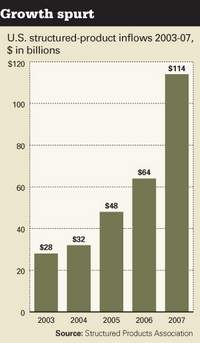by Abigail Moses and Bryan Keogh
Sept. 15 (Bloomberg) -- Morgan Stanley and Goldman Sachs Group Inc. led a record surge in the cost of default protection and a slump in bank bond prices after Lehman Brothers Holdings Inc. filed for bankruptcy.
Credit-default swaps on Morgan Stanley soared to a record and the New York-based firm's senior notes fell the most since they were sold six month ago. Goldman's senior notes plummeted to a record low and the cost of protecting its bonds against default rose to an all-time high.
Sellers were demanding upfront payments for protecting American International Group Inc. and Washington Mutual Inc. on rising concern that they would default.
Investor speculation that Lehman's bankruptcy may trigger further takeovers or mergers roiled credit markets after the Treasury and the Federal Reserve declined to rescue Lehman, as they did in March with Bear Stearns Cos.Merrill Lynch & Co. agreed to be bought by Bank of America Corp. as the credit crisis threatened the global financial industry.
Goldman and Morgan Stanley, the two remaining major Wall Street investment banks, ``made the same mistakes'' as Merrill and Lehman, and ``anybody in that business is at risk,'' said Gregory Habeeb, a portfolio manager at Calvert Asset Management Co. in Bethesda, Maryland.
``The dangers have intensified,'' said Habeeb, who manages $8.5 billion in fixed-income assets and doesn't own Lehman bonds. `` There was a lesson of Bear Stearns and apparently Lehman didn't learn it. The lesson at Bear Stearns and Lehman may have precipitated Merrill to do something.''
Upfront Payments
Credit-default swaps on Morgan Stanley soared 189 basis points to 453 and its senior notes now yield more than a typical bond rated BB, or seven grades lower. Contracts on Goldman jumped 119 basis points to 318 basis points. Credit default swaps on Merrill, the world's biggest brokerage firm, dropped after it agreed to the Bank of America purchase.
Increased credit-market turmoil is forcing 17 financial companies' credit-default swaps to trade upfront, meaning those seeking protection must make an initial payment as well as premiums, signaling rising default concern, according to CMA Datavision.
Sellers demanded 47 percentage points upfront and 5 percentage points a year to protect the bonds of Washington Mutual from default on concern that the biggest U.S. savings and loan won't survive the credit crisis, according to CMA Datavision prices in New York. That compares with an upfront cost of 40 percentage points on Sept. 12 and means it would cost $5 million initially and $500,000 a year to protect $10 million in bonds for five years.
AIG Bonds
The upfront cost to protect AIG bonds from default soared 16.5 percentage points to 29 percentage points after earlier rising to 34 percentage points, CMA data show. The insurer's 5.85 percent notes due in 2018 fell 14.5 cents to 55 cents on the dollar to yield 14.9 percent, according to Trace, the Financial Industry Regulatory Authority's bond-pricing service.
The U.S. government's decision not to bail out Lehman reduces the ``moral hazard'' introduced when Bear Stearns was rescued and the Bank of England nationalized mortgage lender Northern Rock Plc, according to Juan Esteban Valencia, a credit strategist at Societe Generale SA in London.
``The get-out-of-jail-free card turned out not to be worth what they thought,'' said Matt King, head of quantitative credit strategy at Citigroup Inc. in London. ``This makes it much, much harder for financial institutions to get the financing they need.''
Contracts on Wachovia Corp., the fourth-biggest U.S. bank, surged 129 basis points to 582 and JPMorgan Chase & Co. rose 42 to 185, CMA data show. Wachovia's 5.75 percent notes due in 2018 fell 3.9 percent to 73.3 cent on the dollar, while JPMorgan's 6.4 percent bonds due in 2038 trade at 92.6 cents on the dollar after losing 3.7 cents.
Merrill dropped 139 basis points to 319 basis points. Bank of America increased 53 basis points to 212.
Morgan Stanley Notes
Morgan Stanley's 6.625 percent senior unsecured notes due in 2018 fell 10.9 cents to 81.3 cents on the dollar for a yield of 9.7 percent, according to Trace. Debt rated BB on average yields 9.1 percent, according to Merrill's U.S. High-Yield BB Rated index. Morgan Stanley's notes are rated A1 by Moody's Investors Service and A+ by Standard & Poor's.
Goldman's 6.15 percent notes due in 2018 dropped 7.3 cents to 88.3 cents on the dollar to yield 7.9 percent, Trace data show. The New York-based securities firm's 6.35 percent bonds due in 2034 fell 10.6 cents to 71.7 cents on the dollar, for a yield of 9.3 percent.
In Europe, HSBC Holdings Plc, Europe's biggest bank, and Barclays Plc led a jump in the cost of default protection, driving the benchmark Markit iTraxx Financial index of 25 banks and insurers a record 32 basis points higher to 127, according to JPMorgan.
HSBC, Barclays
The Markit CDX North America Investment Grade Index, linked to the bonds of 125 companies in the U.S. and Canada, rose 38 basis points to 189 as of 2:49 p.m., according to broker Phoenix Partners Group. Earlier they traded as high as 190 basis points.
Credit-default swaps on London based HSBC soared 22 basis points to 93, the most ever, according to CMA Datavision prices in London. Barclays, the U.K.'s third-biggest bank, rose 34 to 166, Zurich-based UBS AG jumped 28 to 164 and Spain's Banco Santander surged 22 to 122.
Credit-default swaps, contracts conceived to protect bondholders against default, pay the buyer face value in exchange for the underlying securities or the cash equivalent should a company fail to adhere to its debt agreements. A rise indicates deterioration in the perception of credit quality; a decline signals the opposite.
A basis point on a credit-default swap contract protecting $10 million of debt from default for five years is equivalent to $1,000 a year.
Source: Bloomberg.com.
Subscribe to:
Post Comments (Atom)




No comments:
Post a Comment